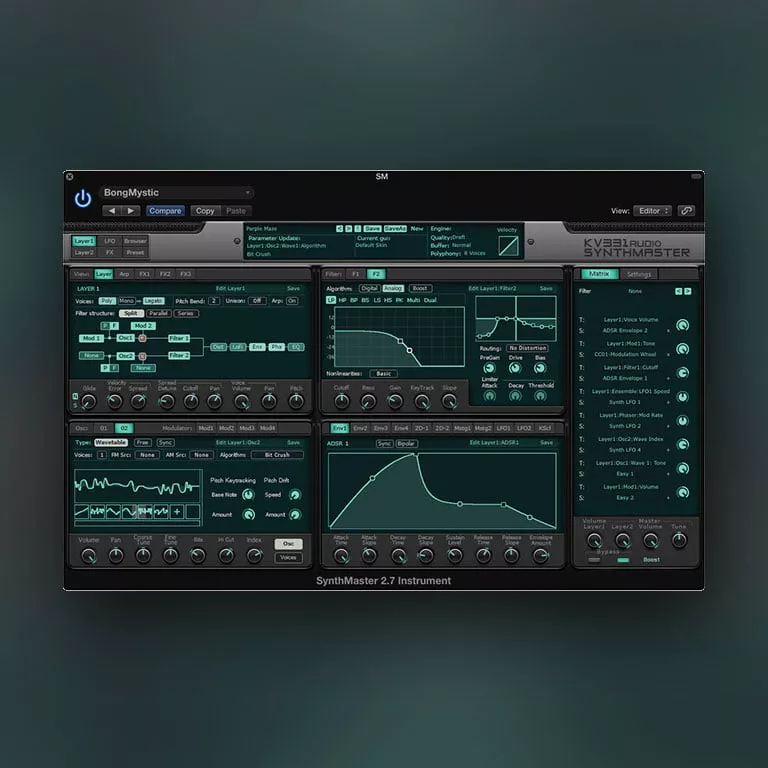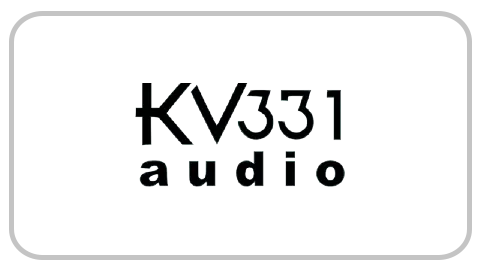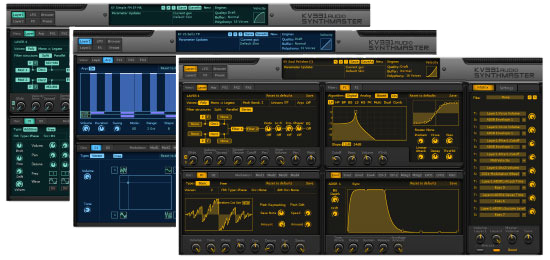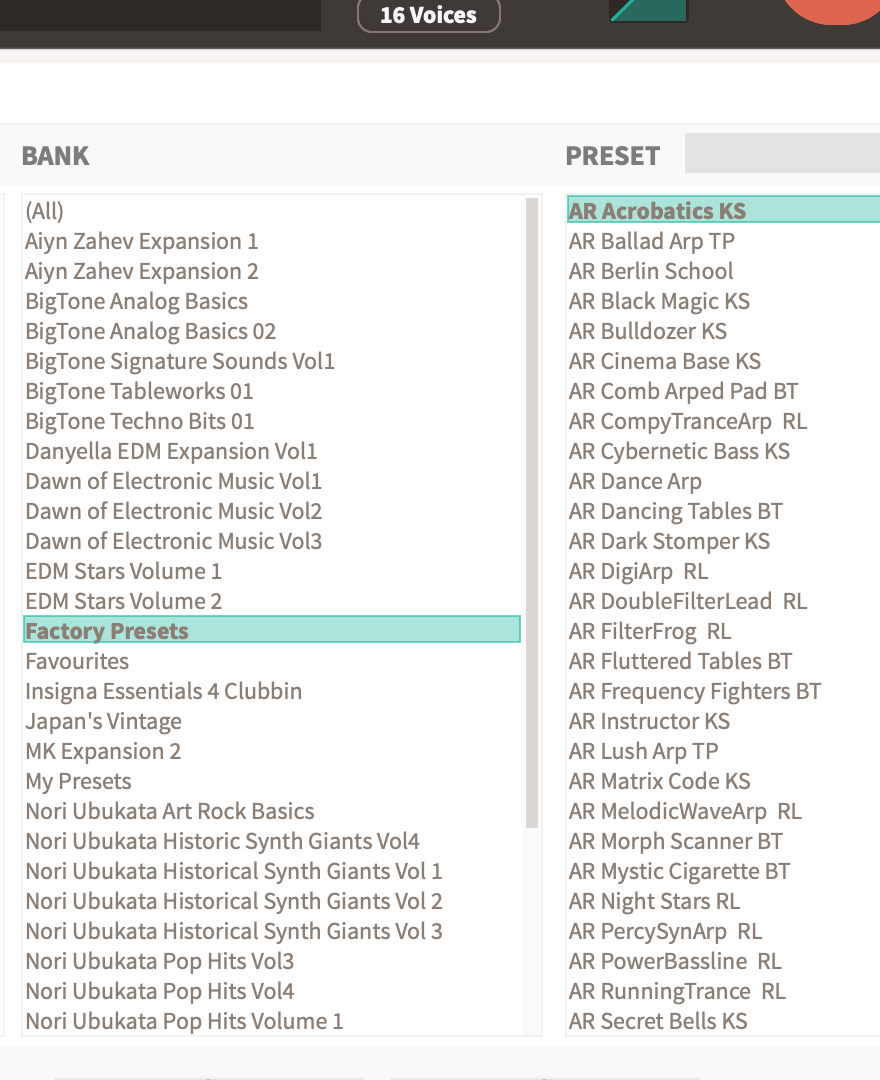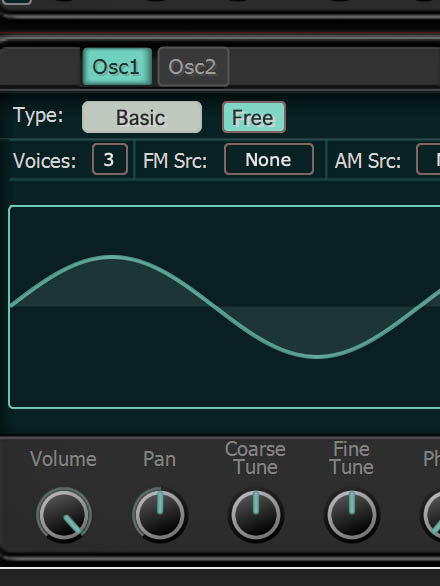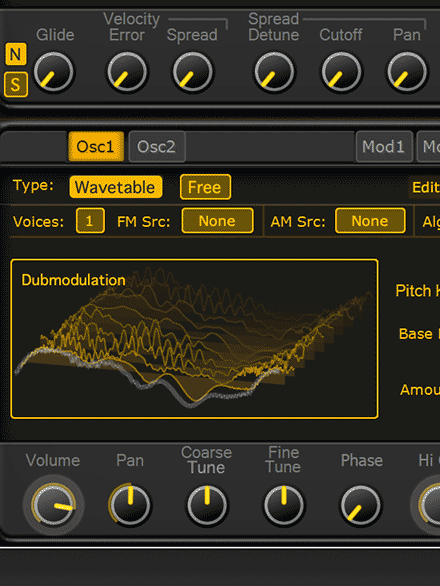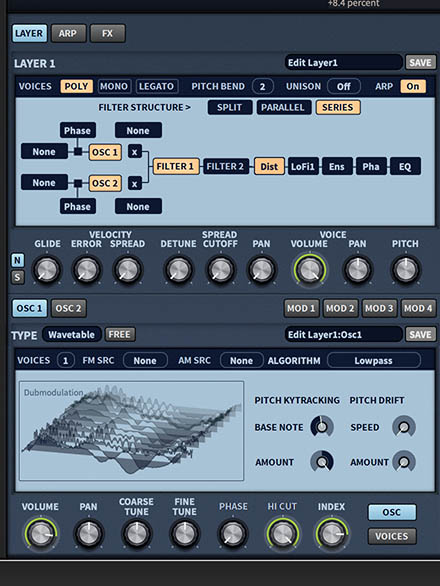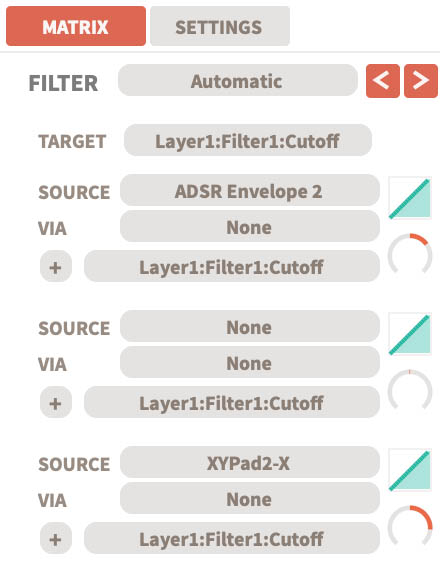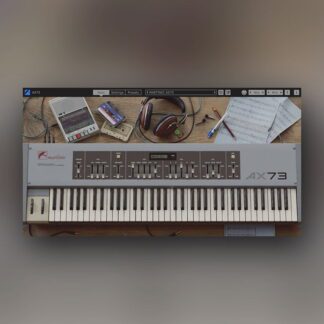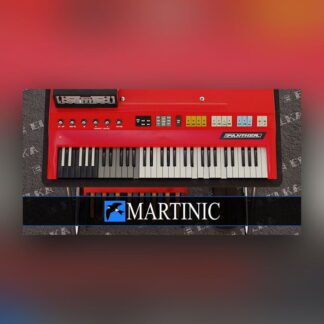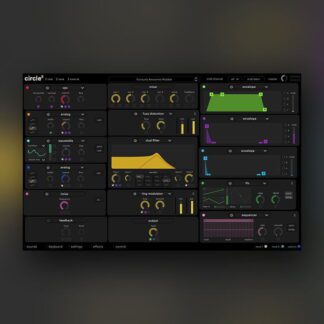
SynthMaster 2 is a two-layer ‘all-around’ semi-modular software synthesizer and effect plug-in that comes with 2000 factory presets right out of the box. It features many different synthesis methods including VA, Additive, Wavetable, Wavescanning, Phase Modulation, Frequency Modulation, Pulse Width Modulation, Ring Modulation, Amplitude Modulation, Physical Modeling and SFZ Sample Playback synthesis.
Features
Cross-Platform
SynthMaster 2 runs as a VST and AAX instrument on both Windows and macOS, and also as an Audio Unit instrument on macOS.
2000 Factory Presets
SynthMaster 2 comes with 2000 factory presets from a world-class team of sound designers: Arksun, Aelyx Design, Aiyn Zahev, Bluffmunkey, BigTone, Frank ‘Xenox’ Neumann, Kevin Schroeder, Nori Ubukata, Rob Lee, Vandalism, Vorpal Sound, Gercek Dorman, Michael Kastrup, Umit Uy, Ufuk Kevser, Teoman Pasinlioglu & Brian ‘Xenos’ Lee.

Oscillators
Stereo Oscillators with Unison/Voice Stacking: Oscillators in SynthMaster 2 have stereo output. Using the “voices”, “voices mix”, “detune curve”, “detune spread”, “pan spread”, “tone spread” and “phase spread” parameters, each basic/wavetable oscillator can generate a rich “supersaw” type sound.
Basic Oscillators
Basic oscillators in SynthMaster 2 are capable of synthesizing many different types of waveforms: Sine, Square, Triangle, Sawtooth, Pulse, Noise, single cycle waveforms and multi-sampled WAV/AIFFs defined in SFZ files. Each oscillator comes with 17 different algorithms in the following categories: Spectral (LP, HP, LS, HS, BP, BS), Bend (Bend+, Bend-, Bend+/-), Sync (Rect Window, Half Cos Window, Cos Window, Tri Window, Saw Window), Pulse (Pulse1, Pulse2) and Quantize.
- Sine, Square, Triangle, Sawtooth, Pulse, Noise.
- Single-cycle waveforms.
- Multi sampled WAV/AIFFs defined in SFZ files.

Wavetable Oscillators
A ‘Wavetable’ oscillator is similar to a basic oscillator, except that the waveform can be scanned (interpolated) through up to 256 different waveforms shapes. The position of the waveform can be adjusted using the ‘wave index’ parameter. Starting with version 2.9, SynthMaster now supports loading wavetables from wave files!
- Contains many wavetables
- You can import your own wavetables by drag and drop

Additive and Vector Oscillators
An ‘Additive’ oscillator is actually 8 ‘basic’ oscillators running together. Each ‘basic’ oscillator has its own detune, tone, phase/pulse width/algorithm parameter, frequency, waveform type and algorithm parameters.
A ‘Vector’ oscillator consists of 4 ‘basic’ oscillators, mixed at different ratios. The mix ratios are determined by 2 orthogonal parameters in 2 dimensions: ‘X Index’ and ‘Y index’.
Semi-Modular Architecture
For each SynthMaster instance, there are 2 layers followed by 2 global effect send busses. The modulators can modulate frequency, phase, amplitude or pulse width of the oscillators or any other modulators at audio rate, or they can be used as regular oscillators. Each layer has its own:
- Arpeggiator
- 2 Oscillators
- 4 Modulators
- 2 Filters
- 4 ADSR Envelopes
- 2 Multistage Envelopes
- 2 2D Envelopes
- 2 LFOs
- 4 Keyscalers

Massive Modulation Architecture
SynthMaster has more hundreds of modulation targets and 48 modulation sources including ADSR Envelopes, 2D Envelopes, Multistage Envelopes, LFOs, KeyScalers, Easy Parameters, Vocoder Bands, MIDI Velocity, Aftertouch, Pitch Bend and MIDI CC. The modulation matrix, which has 64 available slots, has visual filtering as well so that targets for a specific source or sources for a specific target can be filtered and shown on the user interface.
- ADSR Envelopes
- 2D Envelopes
- Multistage Envelopes
- LFOs
- KeyScalers
- Vocoder Bands
- MIDI Velocity
- Aftertouch
- Pitch Bend and MIDI CC

Filters
Zero Delay Feedback Filters: All of the 4 new filter categories in SynthMaster are developed using the zero delay feedback filter technology. With advanced filter parameters like input gain, drive and acid, you can get that “analog” sound from the filters!
- VAnalog Filters – The ‘VAnalog’ filters are modelled after the famous ladder filter, so they self oscillate when the filter resonance is maxed out. They have a continuously variable slope, which is unique to SynthMaster. They have 3 different CPU settings: “Basic”, “Normal” and “High”. The Basic setting sounds similar to the other algorithms in most cases and consumes at least 50% less CPU.
- Multimode Filters – With the new ‘multimode’ filter type, it is possible to switch from Lowpass to Bandpass to Highpass filter types continuously. For analog multimode filters, it is also possible to change the slope of the filter continuously from 0 dB/oct to 24 dB/oct.
- Dual Filters – With the new ‘dual’ filter type, two multimode filters can be run simultaneously, either in parallel or in series. The mix ratios between the filters and the topology (parallel/series) between them can be changed continuously, as well as the modes and cutoff frequencies of the filters.
- Comb Filters – Comb filters are digital filters used in physical modeling synthesis.

Effects
Rich set of Effects: SynthMaster features 11 different effect types: Distortion, LoFi, Ensemble, Phaser, 6 Band EQ, Compressor, Vocoder, Delay, Chorus, Tremolo, Reverb.
- 11 types of effects – Distortion, LoFi, Ensemble, Phaser, 6 Band EQ, Compressor, Vocoder, Delay, Chorus, Tremolo, Reverb.
- Flexible Effects Routing – Each of the 11 effect types can be inserted on any layer insert or on any of the 2 global effect bus inserts.
- Before/Inside/After Filter Distortion – A distortion stage can be inserted before, after, or even inside the filters. For analog filters, the distortion is applied for each of the 4 filter stages in ‘inside’ mode.
Other features
- Powerful Arpeggiator – The arpeggiator in SynthMaster features classic arpeggiator modes such as Up, Down, UpDown, DownUp, UpDown2, DownUp2, AsPlayed as well as Sequence, Chord and Arpeggiate modes. Each of the 32 steps of the arpeggiator has its own Velocity, Note Number, Note Length, Slide and Hold parameters.
- Easy Parameters – SynthMaster features 8 easy knobs and 2 XY pads that can be freely assigned as modulation sources so that the complexity of the synth engine could be hidden away and only the most important parameters of a preset can be controlled by the user. The easy parameters can be globally linked to MIDI controllers, and they can be assigned automatically by SynthMaster as well.
- Microtuning – SynthMaster supports Scala tuning, so tuning can be set either for each preset or globally by loading from a Scala tuning file.
- Preset Browser – SynthMaster features a comprehensive preset browser with separate search criteria for instrument type, preset attributes, music style or preset author.
- Online Presets – Registered users can upload their presets to the online preset library, or browse and download presets created by other registered users; using the preset browser right inside the plug-in window.
- Multiple Skins – SynthMaster comes with 3 different skins in different color variations. Using the included user interface editor, users can not only customize the existing skins but also can create their own custom interfaces as well.
- Importing MIDI patterns as Arpeggiator Sequence – Monophonic or even polyphonic (chord) MIDI patterns can be imported into the arpeggiators in SynthMaster by just dragging and dropping the MIDI file onto the arpeggiator view on the plugin window.
- Importing WAV/AIFF Multisamples as SFZ definitions – Multisamples in WAV/AIFF formats could be imported into SynthMaster as SFZ definitions, by simply dragging and dropping the WAV/AIFF files onto the oscillator waveform view on the plugin window.

